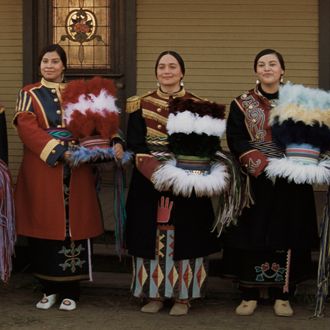
Martin Scorsese’s Killers of the Flower Moon, based on David Grann’s 2007 book of the same name, tells the true story of the Osage Nation and the crimes committed against their people in 1920s Oklahoma. Scorsese’s goal in telling the story was to refocus the narrative on the Osage themselves, rather than the early days of the Federal Bureau of Investigation. Despite having an endorsement from Principal Chief Geoffrey Standing Bear of the Osage Nation, the film, in its second week of release and trailing closely behind Taylor Swift: The Eras Tour, is beginning to widen into a bigger and deeper conversation about, as Chief Standing Bear calls it, “challenging history.”
Devery Jacobs, who starred in Hulu’s acclaimed Reservation Dogs, critiqued the film, calling it “painful, grueling, unrelenting and unnecessarily graphic.” Jacobs, who is a Native actress from Canada and activist, shared “strong feelings” in a Twitter thread on October 23. “I don’t feel that these very real people were shown honor or dignity in the horrific portrayal of their deaths,” she wrote. “Contrarily, I believe that by showing more murdered Native women on screen, it normalizes the violence committed against us and further dehumanizes our people.”
“Indig ppl exist beyond our grief, trauma & atrocities,” she said. “Our pride for being Native, our languages, cultures, joy & love are way more interesting & humanizing than showing the horrors white men inflicted on us.”
In a statement from October 20, Chief Standing Bear said the atrocities laid bare the truth. “Killers of the Flower Moon is an Osage story of trust and betrayal as directed by Martin Scorsese,” Standing Bear in a statement. “While watching, you need to know that this is a true story. Many Osage lives were lost, and whole family trees were forever altered. The film lays bare the truth and injustices done to us, while challenging history not to be repeated. We honor our ancestors who endured this time by continuing to survive and ensuring our future, guided by our Wahzhazhe culture and traditions.”
Gianna Sieke, an Osage Nation princess from 2021 to 2023 who worked on the film, discussed the difficulty of the history portrayed with Today. “It does tell our dark history, but it’s also including things that no one really knows, and it hasn’t been expressed to Osage people and anyone because it’s a dark history,” Sieke said. “People don’t really talk about it that much. And because of that, [the movie] has made a really big impact. Families are learning to cope and understand.” Regarding a scene in which Mollie Burkhart (Lily Gladstone) learns about a family tragedy, Osage Nation Congress member Brandy Lemon, who worked as a liaison between the film and the Osage community, told Today she “still wasn’t ready for it.” “It just hit me in the gut so hard, and every time I watch it, it still does,” she said.
Another point of discussion became Scorsese’s choice to make Ernest Burkhart, a white man who committed the film’s central crimes played by Leonardo DiCaprio, the main character. Christopher Cote, an Osage language consultant on the film, told The Hollywood Reporter on October 19 that “Martin Scorsese, not being Osage, I think he did a great job representing our people, but this history is being told almost from the perspective of Ernest Burkhart — they kind of give him this conscience and kind of depict that there’s love,” he said at the film’s Los Angeles premiere. “But when somebody conspires to murder your entire family, that’s not love. That’s not love, that’s just beyond abuse.”
“I think in the end, the question that you can be left with is: How long will you be complacent with racism?” Cote said. “How long will you go along with something and not say something, not speak up, how long will you be complacent? I think that’s because this film isn’t made for an Osage audience: It was made for everybody, not Osage. For those that have been disenfranchised, they can relate; but for other countries that have their acts and their history of oppression, this is an opportunity for them to ask themselves this question of morality, and that’s how I feel about this film.”


